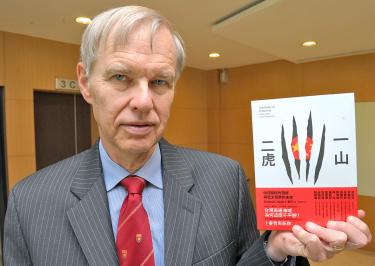Former US ambassador to the UN John Bolton called on Taiwan to renounce China’s “outlandish claims” to disputed territories in the East and South China Seas.
According to Bolton, now a senior fellow at the American Enterprise Institute, China’s goal is to sow discord among its competitors by pitting Vietnam against the Philippines, isolating Japan and “neutralizing” Taiwan.
“Potential hostilities are no longer hypothetical,” Bolton wrote in the Wall Street Journal on Tuesday.
Bolton said he believed the US must work diplomatically, “largely behind the scenes,” to resolve differences among the other claimants — including Taiwan.
Earlier this week, the Ministry of Foreign Affairs asked claimants to the South China Sea dispute to invite Taiwan to join discussions on formulating a code of conduct for the region.
The ministry reiterated that the Pratas Islands (Dongsha, 東沙島), the Spratly Islands (Nansha Islands, 南沙群島), the Macclesfield Bank (Zhongsha Islands, 中沙群島) and the Paracel Islands (Xisha Islands, 西沙群島) belong to Taiwan.
The four island groups and their surrounding waters — potentially rich in natural resources — are also claimed either entirely or in part by China, the Philippines, Vietnam, Malaysia and Brunei.
“The more intra-ASEAN disputes we can eliminate, the greater the potential for a common position,” Bolton wrote. “This pragmatic diplomatic strategy of resolving non-Chinese competing claims hardly guarantees positive results, but it beats repeating academic mantras about international law.”
“Taiwan could also help politically by renouncing China’s outlandish claims to disputed territories,” he added.
Bolton said that China sees the disputed waters, islands, reefs and rock outcroppings through a “prism of increasing proximity.”
He condemned the US Navy cuts due to “draconian” budget reductions and US President Barack Obama’s “diffidence” in protecting US interests abroad.
Bolton urged the US to “decide unequivocally” that Beijing’s expansionism in the East and South China Seas is contrary to US national interests.
“These are high, tangible stakes for us and our Asian and Pacific friends, ranging broadly from Japan and South Korea to Australia and the Association of Southeast Asian Nations (ASEAN) including Indonesia, Malaysia, Vietnam and the Philippines,” Bolton wrote.
The stakes, he said, include undersea mineral resources and sea lanes of communication and trade critical to US and global prosperity.
“This is about power and resolve,” Bolton said.
He added that the US’ approach — watching while initially minor incidents risk escalating — puts Washington at a distinct disadvantage.
“Passivity will allow Beijing to prevail repeatedly, incident after incident, until US weakness becomes so palpable that there is no doubt of China’s across-the-board success,” he wrote.
“America’s China policy should be comprehensive, agile and persistent, but one fixed element must be that the international waters around China will not become Lake Beijing,” he concluded.
In related news, a former chairman of the American Institute in Taiwan (AIT) said yesterday that the row over the disputed Diaoyutai Islands (釣魚台) could be worse.
Speaking in Taipei at the launch of the Chinese-language version of his book The Perils of Proximity: China-Japan Security Relations, Richard Bush said that “if Shintaro Ishihara, the governor of Tokyo, had bought the islands,” instead of the Japanese government, the situation would have been much worse.
The Japanese government signed a ¥2.05 billion (US$26 million) deal on Tuesday to buy three of the Diaoyutai Islands, which are claimed by Japan, Taiwan and China.
This has caused tensions to rise in the region, as the Taiwanese and Chinese governments voiced strong protests against Japan’s move.
Bush said that if Ishihara, a well-known right-wing nationalist, had succeeded in buying the islands, it would have made people in Taiwan, Hong Kong and China “extremely unhappy.”
“It [the situation] is still uncertain, but I think we’ve avoided a disaster,” Bush said.
Source: Taipei Times - 2012/09/13





















